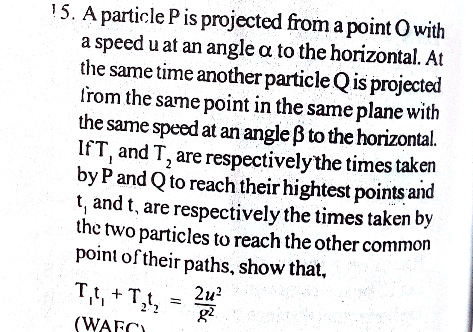Question Number 55190 by Tawa1 last updated on 19/Feb/19

Answered by tanmay.chaudhury50@gmail.com last updated on 19/Feb/19
![0=usinα−gT_1 0=usinβ−gT_2 ((usinα)/(usinβ))=((gT_1 )/(gT_2 )) (T_1 /T_2 )=((sinα)/(sinβ))....(1) x=(ucosα)t_1 y=(usinα)t_1 −(1/2)gt_1 ^2 common point so (x,y) identical for two particle x=(ucosβ)t_2 y=(usinβ)t_2 −(1/2)gt_2 ^2 (ucosα)t_1 =(ucosβ)t_2 ((cosα)/(cosβ))=(t_2 /t_1 ) (t_1 /(cosβ))=(t_2 /(cosα))=k(say) (usinα)t_1 −(1/2)gt_1 ^2 =(usinβ)t_2 −(1/2)gt_2 ^2 usinα×kcosβ−usinβ×kcosα=(g/2)(kcosβ+kcosα)(kcosβ−kcosα) uksin(α−β)=(g/2)×k^2 ×[2cos(((α+β)/2))cos(((α−β)/2))×2sin(((α+β)/2))sin(((α−β)/2)) eliminating sin(α−β) from both side.. u=((gk)/2)×sin(α+β) k=((2u)/(gsin(α+β)))....(2) t_1 =((2ucosβ)/(gsin(α+β))) t_2 =((2ucosα)/(gsin(α+β))) LHS T_1 t_1 +T_2 t_2 =((usinα)/g)×((2ucosβ)/(gsin(α+β)))+((usinβ)/g)×((2ucosα)/(gsin(α+β))) ((2u^2 )/(g^2 sin(α+β)))×[sinαcosβ+cosαsinβ] ((2u^2 )/g^2 )×((sin(α+β))/(sin(α+β))) =((2u^2 )/g^2 )...proved....](https://www.tinkutara.com/question/Q55209.png)
$$\mathrm{0}={usin}\alpha−{gT}_{\mathrm{1}} \\ $$$$\mathrm{0}={usin}\beta−{gT}_{\mathrm{2}} \\ $$$$\frac{{usin}\alpha}{{usin}\beta}=\frac{{gT}_{\mathrm{1}} }{{gT}_{\mathrm{2}} } \\ $$$$\frac{{T}_{\mathrm{1}} }{{T}_{\mathrm{2}} }=\frac{{sin}\alpha}{{sin}\beta}….\left(\mathrm{1}\right) \\ $$$${x}=\left({ucos}\alpha\right){t}_{\mathrm{1}} \\ $$$${y}=\left({usin}\alpha\right){t}_{\mathrm{1}} −\frac{\mathrm{1}}{\mathrm{2}}{gt}_{\mathrm{1}} ^{\mathrm{2}} \\ $$$${common}\:{point}\:{so}\:\left({x},{y}\right)\:{identical}\:{for}\:{two}\:{particle} \\ $$$${x}=\left({ucos}\beta\right){t}_{\mathrm{2}} \\ $$$${y}=\left({usin}\beta\right){t}_{\mathrm{2}} −\frac{\mathrm{1}}{\mathrm{2}}{gt}_{\mathrm{2}} ^{\mathrm{2}} \\ $$$$\left({ucos}\alpha\right){t}_{\mathrm{1}} =\left({ucos}\beta\right){t}_{\mathrm{2}} \\ $$$$\frac{{cos}\alpha}{{cos}\beta}=\frac{{t}_{\mathrm{2}} }{{t}_{\mathrm{1}} } \\ $$$$\frac{{t}_{\mathrm{1}} }{{cos}\beta}=\frac{{t}_{\mathrm{2}} }{{cos}\alpha}={k}\left({say}\right) \\ $$$$ \\ $$$$\left({usin}\alpha\right){t}_{\mathrm{1}} −\frac{\mathrm{1}}{\mathrm{2}}{gt}_{\mathrm{1}} ^{\mathrm{2}} =\left({usin}\beta\right){t}_{\mathrm{2}} −\frac{\mathrm{1}}{\mathrm{2}}{gt}_{\mathrm{2}} ^{\mathrm{2}} \\ $$$${usin}\alpha×{kcos}\beta−{usin}\beta×{kcos}\alpha=\frac{{g}}{\mathrm{2}}\left({kcos}\beta+{kcos}\alpha\right)\left({kcos}\beta−{kcos}\alpha\right) \\ $$$${uksin}\left(\alpha−\beta\right)=\frac{{g}}{\mathrm{2}}×{k}^{\mathrm{2}} ×\left[\mathrm{2}{cos}\left(\frac{\alpha+\beta}{\mathrm{2}}\right){cos}\left(\frac{\alpha−\beta}{\mathrm{2}}\right)×\mathrm{2}{sin}\left(\frac{\alpha+\beta}{\mathrm{2}}\right){sin}\left(\frac{\alpha−\beta}{\mathrm{2}}\right)\right. \\ $$$${eliminating}\:{sin}\left(\alpha−\beta\right)\:{from}\:{both}\:{side}.. \\ $$$${u}=\frac{{gk}}{\mathrm{2}}×{sin}\left(\alpha+\beta\right) \\ $$$${k}=\frac{\mathrm{2}{u}}{{gsin}\left(\alpha+\beta\right)}….\left(\mathrm{2}\right) \\ $$$${t}_{\mathrm{1}} =\frac{\mathrm{2}{ucos}\beta}{{gsin}\left(\alpha+\beta\right)}\:\:\:\:{t}_{\mathrm{2}} =\frac{\mathrm{2}{ucos}\alpha}{{gsin}\left(\alpha+\beta\right)} \\ $$$${LHS} \\ $$$${T}_{\mathrm{1}} {t}_{\mathrm{1}} +{T}_{\mathrm{2}} {t}_{\mathrm{2}} \\ $$$$=\frac{{usin}\alpha}{{g}}×\frac{\mathrm{2}{ucos}\beta}{{gsin}\left(\alpha+\beta\right)}+\frac{{usin}\beta}{{g}}×\frac{\mathrm{2}{ucos}\alpha}{{gsin}\left(\alpha+\beta\right)} \\ $$$$\frac{\mathrm{2}{u}^{\mathrm{2}} }{{g}^{\mathrm{2}} {sin}\left(\alpha+\beta\right)}×\left[{sin}\alpha{cos}\beta+{cos}\alpha{sin}\beta\right] \\ $$$$\frac{\mathrm{2}{u}^{\mathrm{2}} }{{g}^{\mathrm{2}} }×\frac{{sin}\left(\alpha+\beta\right)}{{sin}\left(\alpha+\beta\right)} \\ $$$$=\frac{\mathrm{2}{u}^{\mathrm{2}} }{{g}^{\mathrm{2}} }…{proved}…. \\ $$
Commented by Tawa1 last updated on 19/Feb/19

$$\mathrm{God}\:\mathrm{bless}\:\mathrm{you}\:\mathrm{sir}.\:\mathrm{I}\:\mathrm{really}\:\mathrm{appreciate}\:\mathrm{your}\:\mathrm{effort} \\ $$
Commented by Tawa1 last updated on 23/Feb/19

$$\mathrm{Sir},\:\mathrm{i}\:\mathrm{don}'\mathrm{t}\:\mathrm{understand}\:\mathrm{how}\:\mathrm{you}\:\mathrm{eliminate}\:\:\mathrm{sin}\left(\alpha\:−\:\beta\right)\:\mathrm{sir}. \\ $$
